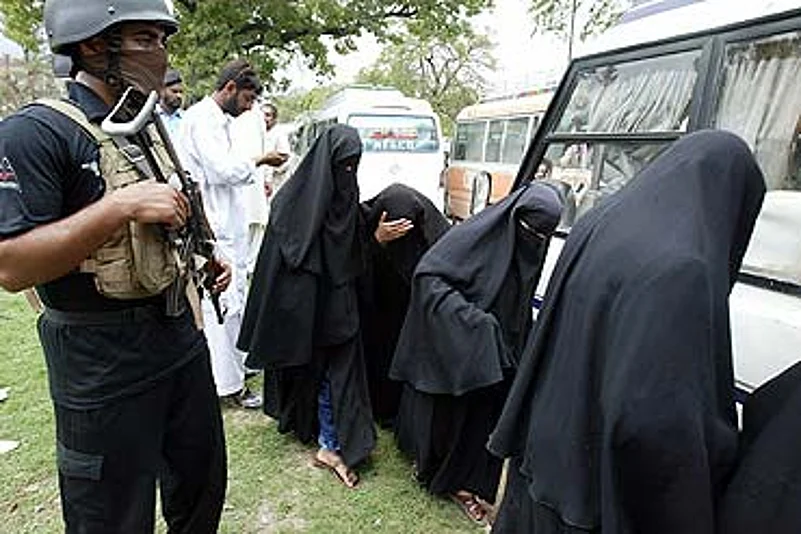Located in the heart of Islamabad, the Lal Masjid complex houses Jamia Hafsa, a madrassa for girls, and Jamia Faridia, a seminary for boys. Their students, guided by clerics and teachers, have been on the rampage since January.
January 22: Occupy a children's library in protest against the demolition of illegally constructed mosques
March 27: Raid a house and kidnap its inmates, accusing them of running a brothel
March 28: Students take hostage three policemen
March 30: Warn owners of CD and video shops to switch to another business or face consequences
April 6: Lal Masjid sets up a Shariah court
April 9: The Shariah court issues fatwa against Pakistan tourism minister Nilofar Bakhtiar for hugging a French paragliding instructor
May 19: Kidnap four policemen after the arrest of around a dozen mosque supporters
June 23: Kidnap nine people, including six Chinese women and a Chinese man, from an acupuncture clinic, claiming it is a brothel
***

Equally contentious is the collapse of the negotiations that Pakistan Muslim League-Q chief Chaudhry Shujaat Hussain was brokering between Musharraf and Ghazi. Following a stand-off, reportedly sparked by Ghazi's refusal to come out of Lal Masjid and negotiate with the delegation of ministers and Sunni ulema, Maulana Fazlur Rehman Khalil, the former chief of the Harkatul Mujahideen, was roped in to negotiate on Ghazi's behalf.
Sources say Maulana Khalil held talks with Musharraf and Shujaat Hussain at the presidency around July 9-10 midnight and then went to Lal Masjid to seek Ghazi's consent to a compromise formula. A draft agreement was prepared, allowing Ghazi and his family safe passage to Dera Ghazi Khan, where he was to be placed under house arrest. It was further agreed that those holed up in the Lal Masjid would be screened, and an amnesty granted to all other than individuals involved in criminal cases.
The draft agreement was then shown to Musharraf who wanted it to be clearly stated that foreign fighters—a handful of Uzbek, Chechen and Arab fighters—will have to face legal proceedings irrespective of their involvement in criminal cases. Maulana Khalil conveyed Musharraf's demand to Ghazi; then Chaudhry Shujaat talked to the cleric over the mobile phone given to him by the government for negotiations. But, according to official versions Ghazi promptly switched off his mobile phone. At 4 am Musharraf ordered the army to fire its first salvo. Ghazi, however, gave his own version to TV channels minutes before Operation Silence began. He said he had agreed to all the terms of the agreement, but the talks broke down when he insisted that he and his associates would surrender before the media and a delegation of clerics. But his demand, said Ghazi, was shot down by Musharraf who was only looking for a pretext to scupper negotiations and kill those in the Lal Masjid.
Operation Silence has, ironically, driven a wedge among the liberals. Editor Najam Sethi justified Musharraf's action to Outlook, "Those who advocated safe passage for Ghazi and his terrorists wrongly believe that Musharraf has unleashed an artificial war in Pakistan to please the Americans. Let us be clear: no government can violate the universal principle of 'no negotiation with terrorists' and live to be praised. The media was allowed to carry on its own negotiations with the terrorists, tacitly bending public opinion in favour of safe passage, which is simply deplorable." Other liberals, however, were scathing. As chairperson of the Human Rights Commission of Pakistan Asma Jahangir told Outlook: "I'd like to ask Musharaf some questions: How could such a crisis occur in the middle of the federal capital, about half a mile from the ISI headquarters? Why did it occur right after the judicial crisis? How did so many hardened militants, some foreigners among them, make their way inside the complex? Why did it take so long for Musharraf to act because had the operation been carried earlier, so many lives would not have been lost? Whatever the answers, he is likely to appear at best incompetent and at worst complicit of attempting to divert public opinion from the real political issue of the moment."

And the political issue of the moment is Musharraf's palpable desire to continue as "president in uniform" and to wean away the people from the growing movement, sparked by the suspension of Chief Justice Iftikhar Chaudhry, for restoration of democracy. Musharraf is also expected to exploit the Lal Masjid to divide the political parties opposing him. For instance, former prime minister Benazir Bhutto may now enter into a deal with Musharraf, a deal reportedly being brokered by the United States. Washington need not now dither from backing Musharraf who had increasingly come under the scanner for his opportunistic policy of appeasing militants and yet participating in Washington's war on terror. Indeed, the US State Department did commend the Musharraf regime for Operation Silence, as has Benazir Bhutto. A Musharraf-Benazir tie-up could position itself as an alliance against fundamentalists.
But the operation has in all probability also sounded the death-knell of the mullah-military alliance that was nurtured over several decades. The Muttahida Majlis-e-Alam, a grouping of religious parties, has called for a three-day mourning to protest against Operation Silence. The MMA has been Musharraf's troubleshooters—it was their vote which allowed Musharraf to remain president in uniform for five years. The collapse of the mullah-military alliance could deprive the army of the formidable support of conservative elements in society—as well as alienate the jawans who are known to be under the spell of religious leaders.
Nawaz Sharif's PML is expected to continue its sally against the general. PML's senior vice-chairman, Raja Zafar Iqbal, told Outlook: "Internationally, Musharraf has been able to salvage his falling reputation as a bulwark against extremists. On the domestic front, the operation can help Musharraf regain some public trust, but it may not be enough to counteract popular disillusionment with his increasingly desperate attempts to cling to power."
The domestic security situation can also worsen further. Since those killed in the Lal Masjid belonged to nwfp, the culture of tribal vendetta may unfold there—and gradually spill over elsewhere. And though these are still early days, much will depend on how those spearheading the movement against the suspension of Justice Chaudhry will harness the ghosts of Lal Masjid to hauntMusharraf.





















